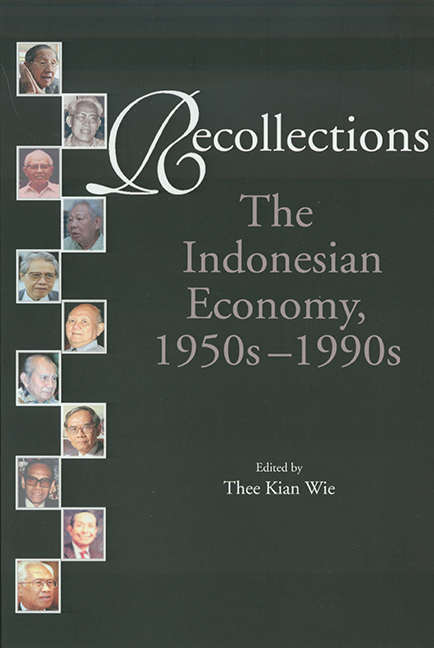Book contents
- Frontmatter
- Dedication
- Contents
- Foreword
- Preface
- Acknowledgments
- Introduction
- II Recollections
- 1 Sumitro Djojohadikusumo
- 2 Mohammad Saubari
- 3 Sjafruddin Prawiranegara
- 4 Abdoel Raoef Soehoed
- 5 Sarbini Sumawinata
- 6 Mohammad Sadli
- 7 Soedarpo Sastrosatomo
- 8 Suhadi Mangkusuwondo
- 9 Emil Salim
- 10 Subroto
- 11 Teuku Mohamad Daud
- Index
- About the Editor
3 - Sjafruddin Prawiranegara
from II - Recollections
Published online by Cambridge University Press: 21 October 2015
- Frontmatter
- Dedication
- Contents
- Foreword
- Preface
- Acknowledgments
- Introduction
- II Recollections
- 1 Sumitro Djojohadikusumo
- 2 Mohammad Saubari
- 3 Sjafruddin Prawiranegara
- 4 Abdoel Raoef Soehoed
- 5 Sarbini Sumawinata
- 6 Mohammad Sadli
- 7 Soedarpo Sastrosatomo
- 8 Suhadi Mangkusuwondo
- 9 Emil Salim
- 10 Subroto
- 11 Teuku Mohamad Daud
- Index
- About the Editor
Summary
I had a Western education – I know Dutch perhaps better than many Dutch people. But I never left Indonesia, and I always tried to keep a relationship with all types of people. And as well as a secular Western education I also had an Islamic education. In this respect I was more fortunate than many Muslims in Indonesia, and indeed in many other parts of Asia. They isolated themselves in religious schools (pesantren), and everything that came from the West was prohibited. Even wearing trousers! Just because the Dutch colonisers were Christians, Christianity was seen as the enemy of Islam. This attitude changed after Independence but still has its adherents. I think many mistakes in economics and politics are due to a lack of understanding by many Muslims about what Islam really stands for. I know, because of my religious education, that humanity is ultimately the purpose of all things.
At first, as a student in the 1930s, I belonged to the so-called cooperators. I believed in the good intentions of the Dutch – their willingness to educate us and develop the country and then ultimately to give us Independence. But when Germany invaded the Netherlands, and the Indonesians in the Volksraad (People's Consultative Council) offered to form an Indonesian militia to help the Dutch defend Indonesia, it was bluntly refused by the Dutch members. That was a great disappointment to me. And afterwards when the Japanese invaded Indonesia, and the Dutch surrendered with practically no resistance, then I lost all confidence in them. After the Dutch surrendered and we experienced the cruelty of the Japanese, then I became certain that Indonesia must become independent. That seemed the only solution even though I felt that we were not sufficiently mature for independence. But it was better to be independent than to live under colonialism.
- Type
- Chapter
- Information
- RecollectionsThe Indonesian Economy, 1950s–1990s, pp. 75 - 86Publisher: ISEAS–Yusof Ishak InstitutePrint publication year: 2003

